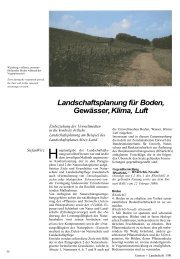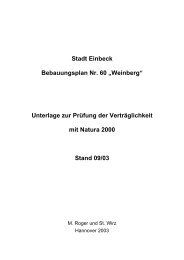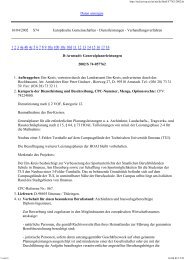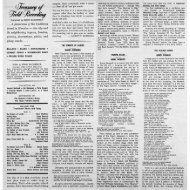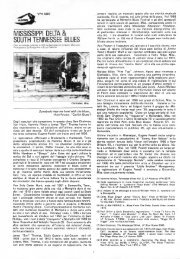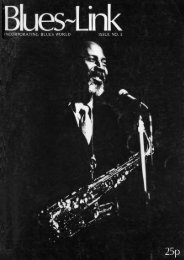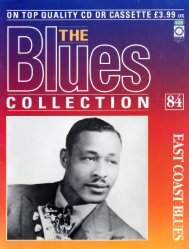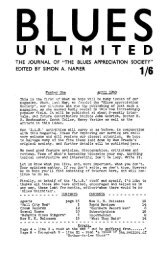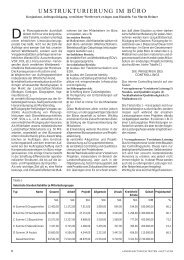memphis jug baimi - Planungsbüro Dipl.-Ing. Stefan Wirz
memphis jug baimi - Planungsbüro Dipl.-Ing. Stefan Wirz
memphis jug baimi - Planungsbüro Dipl.-Ing. Stefan Wirz
You also want an ePaper? Increase the reach of your titles
YUMPU automatically turns print PDFs into web optimized ePapers that Google loves.
undeniably enthusiastic, is generally anarchic and alien to the disciplined music normally<br />
played by the Memphis Jug Band. The poor sound quality of these recordings also<br />
works against one’ s enjoyment, the outstanding one being “ Come Along Little<br />
Children” , sung by Burse and Jones. This is the very old minstrel number, “ Raise A<br />
Rukus Tonight” ; its age may be seen in the lines:<br />
My old mist’is promised me,<br />
When she died she’d set me free<br />
However on this occasion generally there was a singular poverty of musical ideas.<br />
More than two years were to pass before the next, and last, recordings. These were<br />
made in Chicago, for the soon-to-be-extinct Okeh 8000 series, which had not long<br />
previously been taken over by Brunswick. The music was still chiefly ‘ good-time’<br />
material, but of a much higher quality than in 1932. There had been considerable lineup<br />
changes; Ramey had departed (he was not with the band on their 1932 session), and<br />
his kazoo was never again to be heard on record. Gilmore had also gone, but percussion<br />
remained a feature, now handled by Charlie Burse’ s brother, Robert. Jab Jones was<br />
definitely present on some titles, but Dewey Corley played an immensely powerful <strong>jug</strong> on<br />
some titles. Most important of all, Ramey’ s place was taken by Charlie Pierce, a violinist<br />
of truly phenominal powers, who had at one time played in W. C. Handy’ s Orchestra.<br />
Pierce brought a strong hillbilly sound to the band, and the emphasis was on fast harmonica<br />
and/or violin breakdowns, with the <strong>jug</strong> now definitely a front-line voice. In more<br />
than one case, the pieces were effectively fiddle-<strong>jug</strong> duets.<br />
As Sam Charters has pointed out, the leadership of this band was basically a joint<br />
one between Burse and Shade, and the influence of Burse is surely reflected, both here<br />
and in the 1932 titles. Burse was a highly extrovert personality, as the recordings made<br />
after his rediscovery reveal, and the generally exuberant atmosphere prevailing on the<br />
Okeh sides, with their raucous laughter and ‘ scat’ singing, is a manifestation of Burse’ s<br />
musical ideas rather than Shade’ s.<br />
The first song recorded was one of the most lowdown Blues that the Memphis Jug<br />
Band ever recorded, “ Mary Anna Cut-Off” . Jab Jones sang, and produced barrelhouse<br />
piano to rank with the greatest exponents of that form. The title is something of a<br />
mystery; Jones does in fact refer to ‘ Mary Anna’ , but the ‘ Cut-Off is an enigma which<br />
has not so far been explained. The song is nevertheless a classic of its kind.<br />
“ Jazzbo Stomp” and “ Gator Wobble” are both harmonica tours-de-force, and are<br />
in fact very similar in tune, the former being taken at twice the speed of the latter.<br />
“ Jazzbo Stomp” may give us a glimpse o f the band’ s stage-act in the opening dialogue:<br />
"Hey, Jazzbo, play me that Jazzbo Stomp!”<br />
“ Yaassuh!”<br />
Whereupon Shade produces one of the finest harmonica breakdowns ever put on record.<br />
“ Gator Wobble” also features fine harmonica, underpinned by some good washboard<br />
and cowbell work by Bob Burse. The outstanding feature of this tune, next to<br />
Shade’ s playing, is the piano by Jones, who takes off into an excellent solo, on which<br />
Charlie Burse comments:<br />
Play that thing man; you know that’s all my peoples all together there<br />
a remark which, in its recognition of both individual ability and collective empathy,<br />
sums up the qualities which make the Memphis Jug Band such satisfying listening.<br />
The following day the band returned to the studio, this time bringing Charlie Pierce<br />
to play “ Boodie Bum Bum” , a song strongly reminiscient of “ Boodle-De-Bum Bum” by<br />
Blind Bogus Ben Covington, from Alabama. Charlie Burse sang on this side; it is an<br />
interesting, if unsupported conjecture, that he may have had the song first-hand from<br />
his fellow Alabamian.<br />
Burse also sang on “ Take Your Fingers Off It” , performed at a frantic pace and<br />
14




